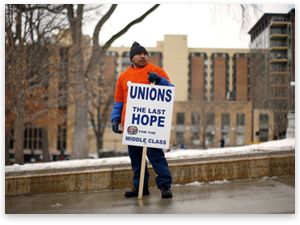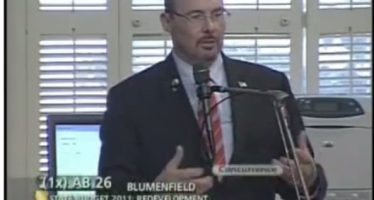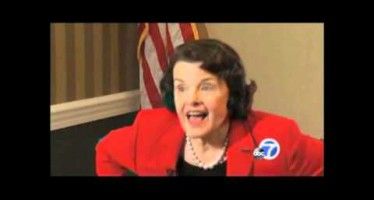Prop. 32 could end union stranglehold on government
By Dave Roberts
“To compel a man to furnish contributions of money for the propagation of opinions which he disbelieves and abhors is sinful and tyrannical.”
— Thomas Jefferson
Propositions come and propositions go, with many amounting to little more than bumps on California’s road to oblivion. But Proposition 32 has the potential to fundamentally transform California, ending the union stranglehold on state government that has led to perennial multi-billion-dollar deficits and the worst business climate in the country.
“After the presidential election, the most consequential political contest in America this year is that over Proposition 32,” declares John Fund in the current issue of National Review. He equates it with Proposition 13, the 1978 tax limitation initiative, in its seismic potential to remake the political landscape.
Prop. 32 bans unions and corporations from using paycheck withholding to fund political activities. Because very few corporations automatically take from employees’ pay to fund political candidates and proposition campaigns, but nearly every union does so with its members’ paychecks, the proposition is actually targeted at unions.
It could have an enormous impact. The top contributor to California politics in the last decade has been the California Teachers Association, with $118 million, according to California Watch. California government employee unions have poured $285 million into state political campaigns from 2001-11.
Unions have pledged $45 million to fight Prop. 32. So far $19 million has come from CTA, $6.7 million from the Service Employees International Union, $2.6 million from California Professional Firefighters, $2.1 million from the AFL-CIO, $1.7 million from the American Federation of State, County & Municipal Employees, $1.5 million from the California School Employees Association, $1.5 million from the Peace Officers Research Association, and $1 million from the California Faculty Association.
That flood of union political spending would likely dry up to a trickle if Prop. 32 passes. Instead of automatic deductions, union members would be forced to write out checks if they wanted to support their union’s political activities. Nearly 95 percent of Utah public school teachers opted not to contribute when it became optional to do so in 2001, according to Fund. More than half of Wisconsin state employees dropped out of AFSCME when the automatic deduction of union dues was terminated last year.
Democrats
The only people who may be more terrified by the passage of Prop. 32 than union officials are Democratic politicians, who are the prime beneficiaries of the millions of dollars sucked out of union members’ paychecks every year.
That may be why Democrats acted as prosecutors, judges, jury members and would-be executioners at a recent informational hearing of the joint Assembly/Senate Budget Committee on Prop. 32. For more than an hour — like a multi-headed Joe Biden on steroids — they grilled, ridiculed and condescendingly lectured Prop. 32 proponents John Kabateck, the California executive director of the National Federation of Independent Business, and David Wolfe of the Howard Jarvis Taxpayers Association.
Oakland Assemblyman Sandré Swanson’s over-the-top rhetoric was typical.
“There’s nothing less than the viability of our democracy in California that’s at stake for the voices of the people to be heard,” he said. “This measure raises serious questions about whether or not the people of the state of California through their organizations and representatives will be able to clearly communicate their positions. I think this is pretty fundamental to our democracy.”
Sen. Lieu
Senator Ted Lieu, D-Torrance, was another attack dog.
“It’s sort of weird to say that Howard Jarvis and the National Federation of Independent Business are now gung-ho union and ‘We are protecting union members,’” said Lieu derisively. “It just smells deceptive. And this whole Proposition 32 is deceptive because of the way it’s being sold. It’s not reform. What it is is taking one thing that unions happen to do, which is payroll deductions, that small businesses don’t, and it’s eliminating it. Unions now no longer have that payroll deduction, so you have just knocked them off at the knees. But billionaires and corporations can keep doing what they are doing.
“So that’s a problem with this proposition to me. It’s not reform, it’s simply a straight power grab. Now you can do that. Just be honest to the voters that that’s what you’re doing — you’re trying to simply shift power to billionaires and corporations — and then we have a debate on it. But this is not campaign finance reform. This is a naked power grab to share power to other entities. And to me it is enormously deceptive. I just don’t really think you should pitch it any other way. Because I think the voters in California are smarter than you think they are.”
Lieu was responding to Kabateck’s argument that, while unions and corporations have dominated state politics, small businesses and average residents have been forgotten.
“During these very troubled economic times I’m hearing the same two things from up and down the state from not only mom-and-pop small business owners but from many other struggling Californians,” said Kabateck. “First of all, they’re very uncertain. Frankly, they’re scared about what tomorrow will bring them, their small business, their employees and their families. Secondly, they are outright frustrated with a government that continues to be in gridlock, and government leaders many of whom just simply aren’t listening to them and instead are choosing to place special interests above theirs.
“But the one silver lining here is that in recent years we are finally witnessing the people of California awakening to political reform, saying enough is enough. And actually taking decisive action to put the power back into the hands of the individual voter and actually hold the elected officials more accountable to the people they are responsible for representing and serving. I think this is best evidenced through recent efforts, certainly voter decisions, to pass historic redistricting reform and voters’ decision to pass an open primary system.
“Proposition 32 is the third leg of important political reform to give the voters more control of their political destiny and make sure that politicians are earning their vote from the people they are expected and elected to serve. It actually ensures the democratization of all Californians by restoring the power to the individual. If you have a heartbeat and you can go into a ballot box to vote, then you, not a corporation or special interest, ought to be the one determining the fate of those serving your district or community. If you’re making that hard-earned dollar in your union, your company or association, then you, not your boss or board of directors, should have a say as to if and, frankly, where that dollar should go politically if at all. I think that’s what our democracy is all about after all.”
Opting out
Assemblywoman Susan Bonilla, D-Concord, countered that the status quo is not undemocratic because union members have the option of opting out by requesting that the political portion of their dues not be deducted from their paycheck.
“Well then, why not just make it an opt in?” asked Kabatek.
Bonilla responded, “Well, we have gone through that for the last 45 minutes. Because the process would be unfair in terms of this application.”
She didn’t elaborate, but was presumably referring to the fact that union spending for political campaigns would drop precipitously as a result, but not for most corporations or wealthy contributors. Several Democrats decried the $4 million to support Prop 32 being spent by American Future Fund, which they suspect is associated with the conservative billionaires Charles and David Koch. The Koch brothers are featured in an anti-Prop. 32 ad receiving regular airplay.
Bonilla’s response indicates she is more concerned about union officials keeping the dollars flowing than she is concerned about helping union members who may not want their dollars spent for political purposes, but may not know they have the option to opt out or may be unwilling to stick their necks out to do so.
Wolfe said that his mother, a conservative, was a member of the California Nurses Association for 20 years.
“To know that she would have had to go essentially to her union rep and ask to be opted out of giving money for political purposes was not something she was comfortable doing,” he said. “She was concerned about the intimidation factor of going against her union. Yet she did it anyway. CNA still has a PAC. They can still spend money out of that PAC for political purposes. Nothing in Proposition 32 prohibits that in any way at all. And if individual nurses and teachers believe in the principles the union or the corporation is fighting for, they can give money for political purposes. So it’s not like unions and corporations won’t be able to spend money at all for political purposes if Prop. 32 passes. It just empowers the individual.
“I bring the perspective of our 200,000 taxpayers from across the state of California. Unlike corporations and unions, we don’t have the ability to use withholding to directly draw from our members’ paychecks. All contributions to our PAC are totally voluntary. As a consequence, we raised about .0001 percent of the money received by special interests. The playing field is not level and the taxpayers are suffering as a result.”
Two previous propositions seeking to provide paycheck protection — Proposition 226 in 1998 and Proposition 75 in 2005 — both failed 53-47 percent. Prop 32 also might be fated to lose by a six-point margin if a Sept. 21 Field poll is any indication. It was losing 44-38 in that poll, with 18 percent undecided.
Related Articles
Donnelly aide works with unions vs. GOP candidates
A top aide to a Republican candidate for governor is working with public employee unions to defeat Republican candidates in
The Green Police Are Coming
If you think the Super Bowl commercial depicting “The Green Police” was a joke, think again. California’s Cap and Trade
Dianne Feinstein’s empty chair
Sept. 26, 2012 Katy Grimes: Has anyone seen Sen. Dianne Feinstein lately? She refuses to debate challenger Elizabeth Emken, she runs





